
Exclusive Interview with Mike Gascoyne
Atlas F1 Editor in Chief
There are probably not that many people in the F1 paddock that are as confident as Mike Gascoyne. After taking Jordan as high as third place in the World Championship in 1999, then taking Renault to the top of the podium last year, the star technical director is now trying to shape Toyota into a Championship winning team - and he's got no doubt he'll do it sooner than you think. Atlas F1's Biranit Goren sat down with Gascoyne for a demonstration of pure ego. Exclusive for Atlas F1
"But since the first race the team has improved pretty rapidly - to be honest, probably more than we expected - so I think the team's operating very well. It's a much sharper operation at the track. We're getting the most out of the car we've got and you can see that from the [qualifying] results [in Spain].
"But ultimately, the real work is making it substantially quicker, and that's happening back in the factory. And that will take time - to reorganise, restructure, re-prioritise and then put all the programs in place. It's happening but, you know, that doesn't happen overnight.
"So, to be honest, based on our performance [on Saturday in Spain] I'm pretty pleased because - given all the things that I know that are wrong and that we can make a lot better - I think our performance was pretty encouraging."
BG: You've been through this process a couple of times now - come into a new team and go about your job of pushing it up the grid. How do you go about doing that?
Gascoyne: "I learned how to do that by being at Tyrrell - where basically the team operates on a very tight budget but to very high standards of engineering. What you had to do was prioritise or you went out of business; if you put your efforts into the wrong thing you went out of business. And I think that learning how to prioritise at a small team - which a lot of the engineers now don't do, because they just work all their lives at very big teams with huge budgets - is more important in a big team like Toyota, or as important as it was at Tyrrell.
"So it's coming in, identifying the key performance areas, know what are the key performance areas, and then directing everyone onto them, so you'd be putting the right amount of resources into the bits that make you go faster and stop doing the bits that don't make any difference. And I think that's the key to improving the racing team - making sure you're working on the things that make you go quicker.
BG: It's a very different process to somewhere like Tyrrell or Jordan, I suppose. I mean, here you've got a very large team with a huge budget. The processes must be somewhat different
Gascoyne: "No, not really. They're exactly the same. You've got more people to deal with, sure, and sometimes it takes longer - it's easier to change direction with a small yacht than it is with a super-tanker. But the process is exactly the same, to be honest. In some respect it's more difficult to change things in a big organisation but on the other hand you have the resources to change it quicker. So it's no different."
BG: You are considered very good at building a technical team from the ground up. But I get the impression that while in Jordan and Renault you were the ultimate boss, reporting only to the team chief, here in Toyota there is a complicated corporate hierarchy that you need to go through
Gascoyne: "There is obviously a lot of senior management, but I think that in terms of... I don't think there's anyone in the factory in Cologne or here at the track that doesn't think that technically I'm the boss. I can assure you of that. So that's not a problem. Yes, there's a level of corporate management because this is a corporate company. But for me does that make a difference? No, absolutely not."
BG: So you get free reigns and backing from that management?
Gascoyne: "Oh yes. Look, I inherited a car. Australia was Australia and you look at it now, there are the results of my input. And the management can see that, and I think John Howett as president has great faith in what's happening. And undoubtedly they've invested the company's future in me and were obviously very concerned about it, and I think they are probably a lot more relaxed now. But ultimately, they need results.
"From my point of view, the great thing about Toyota is that if you look at the things I can't fix - the engine, the factory, the resources, the budget - they are already fantastic. The only bit that's wrong is the chassis and I know how to do that. People ask me if I have pressure here. No, there is no pressure here, it's easy. The only pressure comes from time scales, not from whether we're going to do it or not, because we will."
Gascoyne: "Well, that's the aim of everyone, isn't it? You go to every race to score points and to score a podium. Every team I've gone to, within 12 months I've been there I put it on the podium so, you know, if I don't do that by Suzuka I won't keep that record. So I'll have to do it. But we're not going to score points in every race this season - there's only maybe two teams out there who are going to.
"Having said that, these targets were set before I got here. I could assess exactly where we were and how likely we are to reach these targets, but it wasn't for me to stand up and say that. It is for me to fix the problems and make sure we do reach and exceed those targets in the future. I'm very confident about doing it."
BG: Last year Toyota started off very slowly, and it was at Barcelona that things started turning around. But now it seems you've taken a step backwards
Gascoyne: "Well, to be honest, if you look at our performance in Imola - where we qualified 10th and 13th both last year and this year - and if you look at our performance in Barcelona - where we qualified 8th and 15th [last year] and now 7th and 11th - we are actually doing exactly what we did before. I think we're much more consistent now, though. Whereas you saw the odd quick laps from Toyota last year, if you look here [in Spain] we have been consistently competitive in every session with the people around us and then qualified well.
"So I think we're now a much more consistent team, because of the way the team is operating basically under my guidance. We don't get lost, they don't make the mistakes that they made last year. We get the race strategy right, we change it, we get past people - whereas before they didn't. But that's what my short term tasks are: ensure the race team is efficient and doing as well as we could do. But ultimately we're going to live or die by designing a quicker racing car, because the one that we got now isn't quick enough."
BG: With the resources that you got here, this must be the biggest team you ever worked with?
"I think ultimately the important thing is that the long term things are done properly so that the aerodynamics program is resourced and structured properly; the R&D program, the design office... I mean, there are short-term pressures because Toyota want results and they want them in every race. But I think we've delivered on that because we've made the team operate efficiently, operate with what we've got, which isn't quick enough.
"Ultimately it would be great for Toyota to score points in the next race - and a great relief to everyone. But in a year's time, if we got a car capable of finishing on the podium, who gives a shit if we've got two points here or not? No one. It doesn't matter. So ultimately what's important is to make sure you've got the long term things right. And they paid me enough and I have a broad enough shoulders to take the shit until that happens. And that's my job."
BG: You are oozing with confidence, which makes me wonder if it didn't actually work well for you and for Toyota that just as you came in, Ove Andersson - who was such a central figure for in team's leadership - had moved aside; if you are not effectively filling in the mental space he left behind
Gascoyne: "I don't think Ove not being there makes the slightest difference to me. I get on very well with him and we sit down every evening here and have a glass of wine and have a joke together. I like him a lot. But I get on very well with John Howett as well - he's doing a very good job of supporting me.
"You know, ultimately I'm the bloke I am so I come in and run the team how I'm going to run it, and that's been successful. And I have support from the current management, from Ove - who brought me here - and when I visit Japan, I get great support from all the people over there; they put a lot of faith in me. But that's why they're paying me, that's my job. And my confidence comes from knowing I can do it - I've done it before. So the job needs doing and things need fixing. I know my methods fix; it's easy.
"But I think there was never a strong leadership technically. There was Ove in terms of a racing personality and a guy that's been in the team and built it up. OK, that's changed slightly with John and Mr. Tomita. But I don't think there was ever a strong technical direction. There never was a technical director, and they lacked it. And I think in terms of support of everyone there, everyone is very supportive because they want clear direction. They know they weren't doing it right but they didn't know what to do. And everyone had a different idea of what to do, and of course when you go in a hundred different directions the sum total is fuck all. And they proved it comprehensively for a couple of years.
BG: From what you're saying, effectively Toyota's first major signing, Gustav Brunner, was a failure. He did not deliver.
Gascoyne: "I wouldn't name any names. I mean, the car isn't quick enough - and that's a result of a team effort. So yes, people have to take a responsibility for what they've done but as far as I'm concerned I'm not looking backwards - I'm looking forward for the best way to design a car."
BG: Your career suggests you are obviously drawn by the challenge of setting up a team, moving it up the grid. But at the same time you didn't stay at Renault to bear the fruits of your work. Renault are now moving up and you're not there. Didn't you perhaps leave them too soon?
Gascoyne: "Maybe. You always have a company you'd always like to work for, for the rest of your life, and for me that was Tyrrell. We were the underdog but we were a very good team, very strong engineering team, and it was a great fun working there.
"I think ultimately, any chief designer or technical director who goes to Benetton, Ferrari, Williams or McLaren and wins races - well, he ought to. They've been the top four teams for the last 15 years. So saying you've taken them to be a top four team, well so what? If you hadn't done that you'd be an absolute tosspot. I've enjoyed those challenges - and with Jordan it was even more fun because we shouldn't have been finishing third in the World Championship [in 1999] and win races.
"But I suppose here, in some respects, Toyota are in their third season. If I can do it here in a couple of years, if I can get them on to winning races and then take them on to winning Championships - that's a much more impressive feat than doing it with Renault. If I got employed by Ferrari and got them in four years to win a Championship then so what? Any monkey can do that. So I want to rock the boat, you know, and do it the hard way. Toyota have taken it on the hard way and it sort of appeals to me.
"People say, 'you've never gone on and won the Championship' - well I've never failed to. It's just that I haven't bothered to try yet. When I do, we'll see how we get on. And here is probably the place to try. To me it's more of a challenge to do it with something that is new than to do it with an established top four team. Toyota are now eighth in the Championship. If in two years' time they're winning races and pushing for the Championship, I think that's a greater achievement."
BG: What's been the biggest difference for you between Renault and Toyota?
BG: I suppose personally it's been a change too. Did you move to Cologne?
Gascoyne: "The family hasn't yet, no. I commute [between Germany and England]. I moved into a house there during the week, but in the end of the day, at the moment, I've got three kids - two kids in school and one is 10 months old. If I drag the wife out to Germany and then piss off every five days every two weeks to go to motor races, well that's not fair on her, being left alone in a foreign place.
"So in some respects that worked well and at the moment it's very good: when I worked in motor racing previously I was always back late, always going to the office on a Saturday. Now I fly home to Oxford on a Friday night - I've got my own plane - and I'm at home, and that's it. I can't ring the office, I can't fix any problems. I'm at home. And then when I'm at Cologne during the week, I can stay at the office until late, it doesn't matter; I'm not letting anyone wait up for me, I'm not missing the kids going to bed. I'm at work. And in some respects that's easier than the conundrums of being at home while working.
"So for me it's worked out quite well because I need to spend more time in the factory; ultimately you win motor races in the wind tunnel, you win them in the factory by designing a quicker car.
"But I think the one problem for me here, compared to Renault, is that we lack the senior experienced staff that I can delegate responsibilities to, knowing they've got the experience to run it. At the moment I don't really have enough of that backup and the right people are difficult to find. So it means I have to be in five places at once and you can't be, so it means things take longer. And that's the frustration at the moment. I mean, individually, in all areas, I can fix Toyota in three months. But because I can't be in five areas at once, it takes 15 months. It's as simple as that."
BG: Toyota bringing you on board was a statement that by signing a top-tier technical director the team are ready to move to the next step; they want results sooner rather than later. In the same fashion, isn't it now time for the team to sign a top-tier driver?
Gascoyne: "To me it's irrelevant. If I give our two drivers the quickest racing car on the grid, can they win races and Championships? Yes, they can. Olivier [Panis] is one of the few guys that won races in Formula One; Cristiano [da Matta] has won a championship in a top-flight motorsport and it's difficult to do that. So, if we gave our two drivers a quick enough car, would they win races? Yes. Therefore the job is to give them a quicker racing car.
"Ultimately, if we're going to win the World Championship, Toyota will need drivers that can win races consistently - and for that you need top flight drivers, undoubtedly. And that is undoubtedly on Toyota's agenda. But at the moment to me, as a technical director, it's irrelevant. We need to give them first a quicker racing car."
Gascoyne: "I think we will be ready in the middle of next year... and read into it what you will!"
BG: OK, if you can get anyone in this paddock - whether it's an engineer or a mechanic or a driver or a designer - if you could bring anyone over to Toyota, who would it be?
Gascoyne: "Well that's a loaded question, isn't it?"
BG: Come on, fantasise!
Gascoyne: "If I'm going to fantasise it ain't going to be about bringing in an engineer or a driver, quite frankly! I may work in motor racing but I ain't that stupid!
"OK, OK... Let's think... Well, anyone is going to say they want Michael [Schumacher] to drive their car, that's the obvious answer. So let's not take that. Probably I'd say [Fernando] Alonso, to drive it on a long term contract."
BG: What about Jenson Button? He's another up and coming star that you worked with
Gascoyne: "Yeah, well done to the guy! In 2001, [when we worked together in Benetton] he didn't do a great job. He was a young guy, he had a lot of bad management around him at the time, a lot of bad advice. He's been told he was the greatest thing, and I don't think he was doing his job as well as he could do.
"But I think he now very much deserves his success, especially for the way he drove last year against [Jacques] Villeneuve - and all the games Villeneuve tried to play with him. I think he did a fantastic job to blow Villeneuve away and cemented his future, and so he deserves to enjoy the success of that. He's driving very well now."
BG: And he's doing it with for other Japense automaker. How much of a pressure does it add when the Honda are much better than you?
Gascoyne: "For me personally it doesn't bring any pressure because to win a World Championship you still have to beat everyone. Undoubtedly, it has an effect on the management and in Tokyo, because they'd probably handle not winning as long as they're beating the other one. But for me they're just another racing team."
BG: Are you in fact impressed with BAR's performance?
Gascoyne: "I think they've done a good job - to come from where they were and to join the quicker teams, they're undoubtedly one of the top four now. But at the same time I think they've been flattered a little bit by the lack of performance of others... let's see where they are over a season."
Gascoyne: "Let's just see... They've maximised what they've got while others haven't, and if they continue to do that then well done, you know. Ultimately, they have made that step and they are competitive. For them to finish fourth and beat McLaren will be a major achievement."
BG: What about Ferrari? Why are they so much better this year than anybody else?
Gascoyne: "Well I think there are two things to bear in mind. One thing is that you've got a tyre war. Tyre wars are great if, like last year, one manufacturer is better than another and the quickest car is getting supplied by the one that isn't the best, while the three teams chasing it are getting supplied by the better tyre. In that situation tyre wars are fantastic. You reverse it, and it's dreadful."
BG: You think that Bridgestone are better than Michelin?
Gascoyne: "At the moment, yeah. They're stronger. Are Ferrari doing a much better job than they did last year? I'm not sure that they are. Are Bridgestone - compared to Michelin - doing a better job for Ferrari now than last year? Yes, I'm sure they are. But it can change, and it will change in years to come.
"To me, as an engineer, that's the way Formula One should be. If you want to make it into a one make racing series, go and watch F3000, and I didn't see anyone overtake at the front there either, so that's not the answer. If you want people to support teams, then don't change Formula One."
BG: The common idea in the paddock is that Michelin still have the better tyre...
Gascoyne: "I think the tyres are inherently different. Michelin can have very good one-lap performance but quite high drop-off. But you have to say, so far all races have been in cool conditions - even races where you'd have bet your mortgage on it being hot, like Malaysia - where it actually rained at the start - or Bahrain, where there was a bloody sandstorm, for god's sake! So I think under those cool conditions Bridgestone are undoubtedly stronger.
"The other thing about Ferrari is that Formula One's strength is the team identity and the fact that everyone has to be a constructor. It's also Formula One's inherent weakness, because it means someone's going to do it better than the other and win all the races. So you always have periods of dominance from the top teams. It's always been the case. That superiority lasts as long as you have engineering stability. It's got nothing to do with the drivers - you can chop and change them anyway you like. The key is engineering stability.
"With Patrick [Head] and Adrian [Newey] there, Williams had it. When they lost it, they stopped winning. As simple as that. And Ferrari have had a stability in the last few years, with Ross [Brawn] and Rory [Byrne] and all their technical people. So the key is technical stability. But in 2006, when they retire, Ferrari will go downhill and the next team that's in the right position will spend three or four years winning everything. My aim is to ensure that that's Toyota. A year ago I was trying to ensure that it's Renault - now I'm trying to make sure that it's Toyota."
BG: How do you feel about Renault's success this year? How proud does that make you?
Gascoyne: "I am proud of what I achieved with Renault - I put a lot into it. Especially in 2001, when I was getting a lot of shit for what was going on. I am very proud of carrying them through that and of what they are now achieving.
"But in terms of what they are doing now I think that, well, they should enjoy it while they can - because we're right behind them, and we're coming!"
BG: You've been with Toyota for six months now. How are you fitting in?
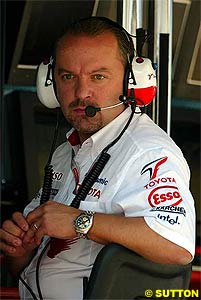 Mike Gascoyne: "I think it's working out pretty well. There's a lot of work to do, a lot of progress to be made. Obviously it was a difficult start to the season, with this car, but it wasn't really a surprise to me - based on my knowledge of where the opposition is and where we were. So it was easy for me to see what needed improving. Those sort of programs are in place, they're long-term programs so they take a while to work through, but that's all happening.
Mike Gascoyne: "I think it's working out pretty well. There's a lot of work to do, a lot of progress to be made. Obviously it was a difficult start to the season, with this car, but it wasn't really a surprise to me - based on my knowledge of where the opposition is and where we were. So it was easy for me to see what needed improving. Those sort of programs are in place, they're long-term programs so they take a while to work through, but that's all happening.
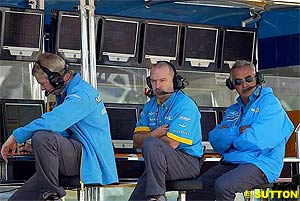 "My old boss Harvey Postleswaithe used to say 'any idiot can design a Formula One car, the trick is to design a quick one.' Toyota can design a perfectly good F1 car, you know. Benetton, when I went there, could design a perfectly good F1 car; Jordan could too. they just weren't designing quick ones. So it's my job to go in and say, 'well stop doing this and this and this. This is what we need to do, and do that and that and that'. Put very simply, that's it."
"My old boss Harvey Postleswaithe used to say 'any idiot can design a Formula One car, the trick is to design a quick one.' Toyota can design a perfectly good F1 car, you know. Benetton, when I went there, could design a perfectly good F1 car; Jordan could too. they just weren't designing quick ones. So it's my job to go in and say, 'well stop doing this and this and this. This is what we need to do, and do that and that and that'. Put very simply, that's it."
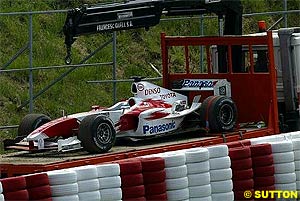 BG: Time scale is very important, actually, because Toyota's team principal Tsutomu Tomita said in the launch, back in January, that your objective this year is to score points in every race...
BG: Time scale is very important, actually, because Toyota's team principal Tsutomu Tomita said in the launch, back in January, that your objective this year is to score points in every race...
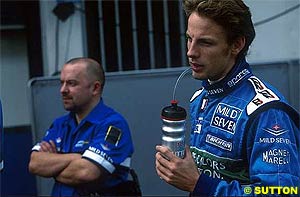 Gascoyne: "I wouldn't say that. In the end of the day, in [Renault's] Enstone factory we had 450 people doing the chassis. I think if you actually look at it, I have now 390 people doing the same job. So it's actually the same size. And, although we're a new team, we're not coming in like a Jordan or whatever - we've come in to be a top team. McLaren have had 25 years to invest in their facilities, and Ferrari and Williams have done it over decades. We've had to do it in two years. Well, you have to invest a lot of money to match what they've done in 20 years. And Toyota has come in to be a top team. And will be.
Gascoyne: "I wouldn't say that. In the end of the day, in [Renault's] Enstone factory we had 450 people doing the chassis. I think if you actually look at it, I have now 390 people doing the same job. So it's actually the same size. And, although we're a new team, we're not coming in like a Jordan or whatever - we've come in to be a top team. McLaren have had 25 years to invest in their facilities, and Ferrari and Williams have done it over decades. We've had to do it in two years. Well, you have to invest a lot of money to match what they've done in 20 years. And Toyota has come in to be a top team. And will be.
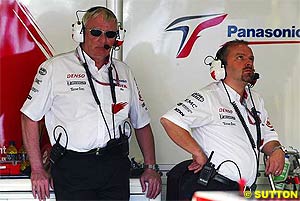 "When someone comes in and says 'no, I've done all of that, you don't want to do that, you want to do this and do it quickly and get on with it' - everyone's saying 'well thank god for that. We know where we're going and let's get on with it.' So I think the place is a much happier place because there's some directions and someone making decisions. The whole thing struggled from a lack of decision-making and with people that didn't have the experience or the capabilities to make the decisions. And so the wrong people got involved in making them and you disappear up your own arse, and that was Toyota. And, you know, that's why I was brought it, that's what I've done, that's what I'm doing. If I get it right it will be a success and if I don't they'll kick me out."
"When someone comes in and says 'no, I've done all of that, you don't want to do that, you want to do this and do it quickly and get on with it' - everyone's saying 'well thank god for that. We know where we're going and let's get on with it.' So I think the place is a much happier place because there's some directions and someone making decisions. The whole thing struggled from a lack of decision-making and with people that didn't have the experience or the capabilities to make the decisions. And so the wrong people got involved in making them and you disappear up your own arse, and that was Toyota. And, you know, that's why I was brought it, that's what I've done, that's what I'm doing. If I get it right it will be a success and if I don't they'll kick me out."
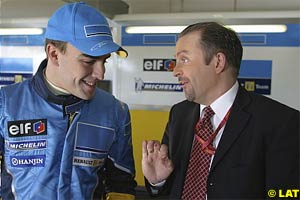 Gascoyne: "There's not a lot. I think Renault had a lot of experienced people that were pissed off as they won the WC a few years before; here you've got much more motivated people, much more enthusiastic people but much less experienced people. We need to build the team up and strengthen it, but everyone's an asset - you just got to let them do what they're good at and stop them from doing what they're crap at. So it's different."
Gascoyne: "There's not a lot. I think Renault had a lot of experienced people that were pissed off as they won the WC a few years before; here you've got much more motivated people, much more enthusiastic people but much less experienced people. We need to build the team up and strengthen it, but everyone's an asset - you just got to let them do what they're good at and stop them from doing what they're crap at. So it's different."
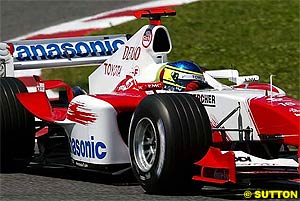 BG: Ove Andersson has said throughout last year that the team are not ready yet to have a top-flight, star driver. Do you think that Toyota are now ready for one?
BG: Ove Andersson has said throughout last year that the team are not ready yet to have a top-flight, star driver. Do you think that Toyota are now ready for one?
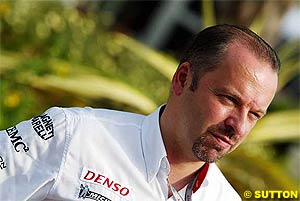 BG: You sound reserved
BG: You sound reserved
|
Contact the Author Contact the Editor |
Please Contact Us for permission to republish this or any other material from Atlas F1.
|
Volume 10, Issue 19
Atlas F1 Exclusive
Exclusive Interview with Mike Gascoyne
Bjorn Wirdheim: Going Places
Ann Bradshaw: Point of View
2004 Spanish GP Review
2004 Spanish GP Review
Technical Review: Spain 2004
Full House
Stats Center
Qualifying Differentials
SuperStats
Charts Center
Columns
The F1 Insider
Season Strokes
Elsewhere in Racing
The Weekly Grapevine
> Homepage |